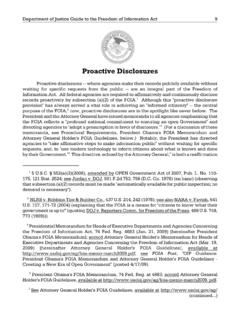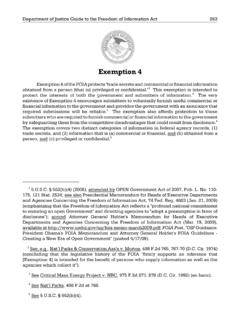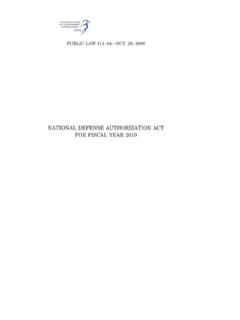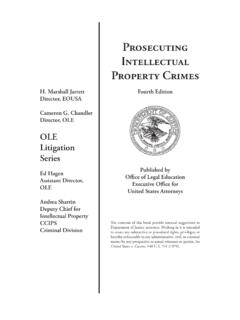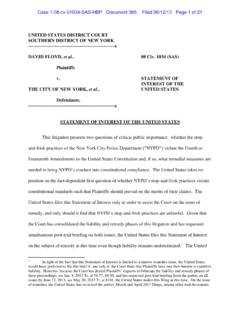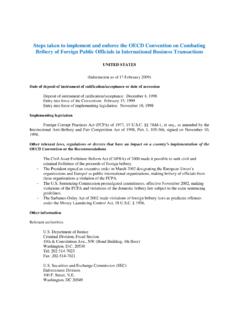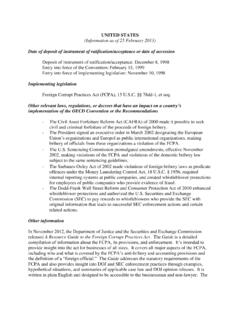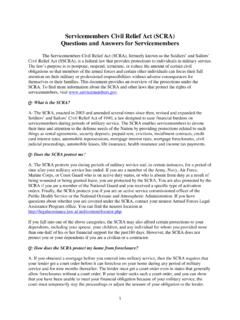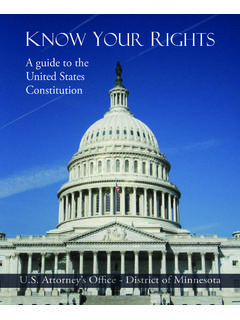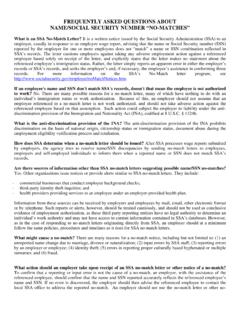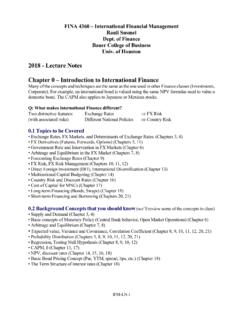Transcription of Matter of A-R-C-G- et al., Respondents
1 Cite as 26 I&N Dec. 388 (BIA 2014) Interim Decision #3811 388 Matter of A-R-C-G- et al., Respondents Decided August 26, 2014 Department of Justice Executive Office for Immigration Review Board of Immigration Appeals Depending on the facts and evidence in an individual case, married women in Guatemala who are unable to leave their relationship can constitute a cognizable particular social group that forms the basis of a claim for asylum or withholding of removal under sections 208(a) and 241(b)(3) of the Immigration and Nationality Act, 8 1158(a) and 1231(b)(3) (2012). FOR RESPONDENT: Roy Petty, Esquire, Rogers, Arkansas FOR THE DEPARTMENT OF HOMELAND SECURITY: George R. Martin, Appellate Counsel AMICI CURIAE: American Immigration Lawyers Association;1 Center for Gender & Refugee Studies;2 Federation for American Immigration Reform;3 National Immigrant Justice Center;4 United Nations High Commissioner for Refugees5 and Williams & Connolly, LLP6 BEFORE: Board Panel: ADKINS-BLANCH, Vice-Chairman; MILLER and GREER, Board Members.
2 ADKINS-BLANCH, Vice Chairman: In a decision dated October 14, 2009, an Immigration Judge found the Respondents removable and denied their applications for asylum and withholding of removal under sections 208(a) and 241(b)(3) of the Immigration and Nationality Act, 8 1158(a) and 1231(b)(3) (2006). The Respondents have appealed from that decision, contesting only the denial of their applications for relief from removal. We find that the lead respondent, a victim of domestic violence in her native country, is a 1 Phillip L. Torrey, Deborah E. Anker, Sabrineh Ardalan, Benjamin Casper, and Fatma E. Marouf, Esquires 2 Karen Musalo, Blaine Bookey, Lisa Frydman, and Christine Lin, Esquires 3 Michael M. Hethmon, Esquire 4 Lisa Koop, Ashley Huebner, and Charles Roth, Esquires 5 Pamela Goldberg, Esquire 6 Allison B.
3 Jones and Ana C. Reyes, Esquires Cite as 26 I&N Dec. 388 (BIA 2014) Interim Decision #3811 389 member of a particular social group composed of married women in Guatemala who are unable to leave their relationship. The record will be remanded to the Immigration Judge for further proceedings. I. FACTUAL AND PROCEDURAL HISTORY The lead respondent is the mother of the three minor The Respondents are natives and citizens of Guatemala who entered the United States without inspection on December 25, 2005. The respondent filed a timely application for asylum and withholding of removal under the The Immigration Judge found the respondent to be a credible witness, which is not contested on appeal. It is undisputed that the respondent, who married at age 17, suffered repugnant abuse by her husband.
4 This abuse included weekly beatings after the respondent had their first On one occasion, the respondent s husband broke her nose. Another time, he threw paint thinner on her, which burned her breast. He raped her. The respondent contacted the police several times but was told that they would not interfere in a marital relationship. On one occasion, the police came to her home after her husband hit her on the head, but he was not arrested. Subsequently, he threatened the respondent with death if she called the police again. The respondent repeatedly tried to leave the relationship by staying with her father, but her husband found her and threatened to kill her if she did not return to him. Once she went to Guatemala City for about 3 months, but he followed her and convinced her to come home with promises that he would discontinue the abuse.
5 The abuse continued when she returned. The respondent left Guatemala in December 2005, and she believes her husband will harm her if she returns. The Immigration Judge found that the respondent did not demonstrate that she had suffered past persecution or has a well-founded fear of future persecution on account of a particular social group comprised of married women in Guatemala who are unable to leave their relationship. The Immigration Judge determined that there was inadequate evidence that the respondent s spouse abused her in order to overcome the fact that she 7 We will refer to the lead respondent as the respondent. The minor Respondents are derivatives of their mother s asylum application. 8 The respondent s asylum application, which was filed after May 11, 2005, is governed by the amendments to the Act brought about by the REAL ID Act of 2005, Division B of Pub.
6 L. No. 109-13, 119 Stat. 302. See Matter of S-B-, 24 I&N Dec. 42 (BIA 2006). 9 This child was born in 1994 and was residing in Guatemala at the time of the proceedings. Cite as 26 I&N Dec. 388 (BIA 2014) Interim Decision #3811 390 was a married woman in Guatemala who was unable to leave the relationship. He found that the respondent s abuse was the result of criminal acts, not persecution, which were perpetrated arbitrarily and without reason. He accordingly found that the respondent did not meet her burden of demonstrating eligibility for asylum or withholding of removal under the Act. On appeal, the respondent asserts that she has established eligibility for asylum as a victim of domestic violence. The Department of Homeland Security ( DHS ) initially responded that the Immigration Judge s decision should be upheld.
7 We subsequently requested supplemental briefing from both parties and amici curiae to address the issue whether domestic violence can, in some instances, form the basis for a claim of asylum or withholding of removal under sections 208(a) and 241(b)(3) of the See Matter of R-A-, 22 I&N Dec. 906 (BIA 1999) (en banc), vacated, 22 I&N Dec. 906 ( 2001), remanded, 23 I&N Dec. 694 ( 2005), remanded and stay lifted, 24 I&N Dec. 629 ( 2008). In response to our request for supplemental briefing, the DHS now concedes the respondent established that she suffered past harm rising to the level of persecution and that the persecution was on account of a particular social group comprised of married women in Guatemala who are unable to leave their relationship. However, the DHS seeks remand, arguing that further factual development of the record and related findings by the Immigration Judge are necessary on several issues before the asylum claim can be properly resolved.
8 The respondent opposes remand and maintains that she has met her burden of proof regarding all aspects of her asylum claim. We accept the parties position on the existence of harm rising to the level of past persecution, the existence of a valid particular social group, and the issue of nexus under the particular facts of this case. We will remand the record for further proceedings. II. ANALYSIS A. Particular Social Group The question whether a group is a particular social group within the meaning of the Act is a question of law that we review de novo. 8 (d)(3)(ii) (2014); see Malonga v. Mukasey, 546 546, 553 (8th 10 We acknowledge with appreciation the thoughtful arguments raised in the briefs submitted by amici curiae. Cite as 26 I&N Dec. 388 (BIA 2014) Interim Decision #3811 391 Cir.)
9 2008). The question whether a person is a member of a particular social group is a finding of fact that we review for clear error. 8 (d)(3)(i). We initially considered whether victims of domestic violence can establish membership in a particular social group in Matter of R-A-, 22 I&N Dec. at 907. We reversed an Immigration Judge s finding that the respondent in that case was eligible for asylum on account of her membership in a particular social group consisting of Guatemalan women who have been involved intimately with Guatemalan male companions, who believe that women are to live under male domination. Id. at 911. The majority opinion reasoned that the proffered social group was defined principally, if not exclusively, for purposes of the asylum case and that it was unclear whether anyone in Guatemala perceives this group to exist in any form whatsoever, including spousal abuse victims themselves or their male oppressors.
10 Id. at 918. We further reasoned that even if the proffered social group was cognizable, the respondent did not establish that her husband harmed her on account of her membership in the group. Id. at 920 23. The Acting Commissioner of the former Immigration and Naturalization Service ( INS ) referred the decision to the Attorney General for In 2001, Attorney General Janet Reno vacated our decision in Matter of R-A-, 22 I&N Dec. 906. She remanded the case for the Board s reconsideration following final publication of proposed regulations that addressed the meaning of various terms in asylum law, including persecution, membership in a particular social group, and on account of a protected characteristic. See Asylum and Withholding Definitions, 65 Fed. Reg. 76,588, 76,597 98 (proposed Dec.)
